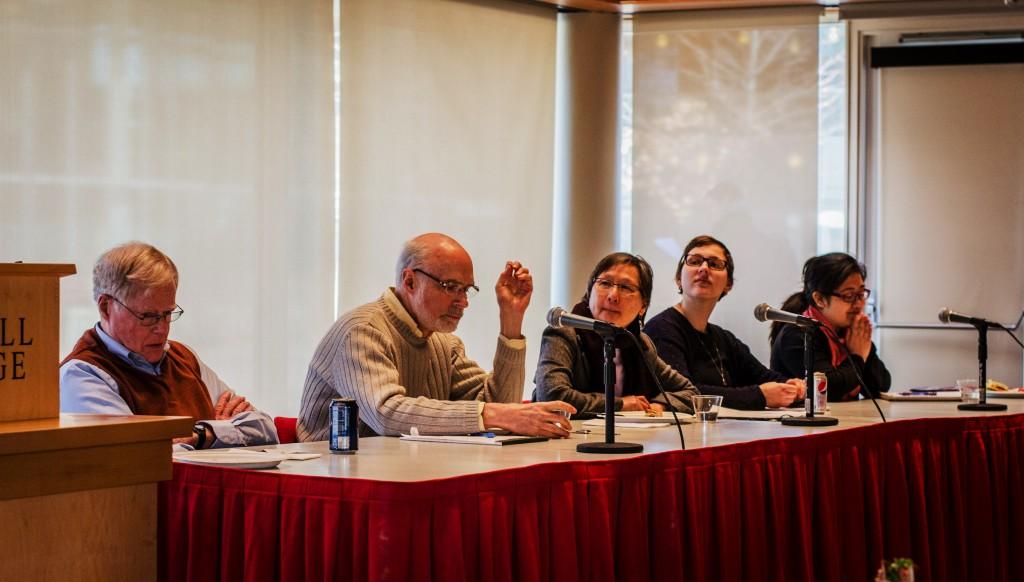By Antoinette Cudney
cudneyan@grinnell.edu
A Peace Studies Program Panel Wednesday at noon discussed the history of the program, the events it has created and sponsored and what the future of Peace Studies might look like. The panel consisted of George Drake ’56, Professor Emeritus of History; Kent McClelland, Sociology; Matthew Johnson, History; Ami Shrestha ’13; Val Vetter, Peace Studies coordinator and Eliza-Eve Leas ’13, Co-Editor-in-Chief of the S&B.
Drake discussed the history of the program in detail. Peace Studies at Grinnell traces its origins to the Iowa Peace Institute. The Iowa Peace Institute looked at conflict resolution on a number of levels, from international relations to training people on campus in conflict resolution.

“[The institute] proved to be quite adept at this and I think quite successful,” Drake said. “Ironically, about that time, the state funding was withdrawn. And so the Peace Institute was left on its own resources.”
The institute was left with its endowment and after some debate about how the endowment should be used. Grinnell College eventually adopted it as the Peace Studies program.
“Peace studies sometimes gives people the wrong impression,” McClelland said. “There’s much more to what we’ve been doing.”
The program, in actuality, looks at both peace and conflict, as well as how conflict could be resolved without the use of violence. McClelland also discussed the program and the possibility of a Peace Studies concentration in the future. McClelland taught a course on Sociology of Conflict when he was asked to help with the Peace Studies Program.
“We have identified many courses in the curriculum that already connect with peace studies,” Vetter said. “We have connected with faculty on campus that teach courses that deal with peace studies and these courses are listed at the front of the schedule of courses. I think this demonstrates that there’s a lot on campus that connects with peace studies and we’re looking for a major link here.”
Over the past decade, the Peace Studies Program has sponsored and created many programs. The College’s Liberal Arts in Prison program was founded in large part with the help of Peace Studies. The program has also sponsored students to protest at the School of the Americas recently and gives opportunities to students to intern in fields related to peace studies. It has looked into partnerships with other peace studies programs, such as the George Mason Peace Operations Program and Kroc Institute for International Peace Studies. Every two years, the program holds a Peace Studies conference where students can share their work and present them before panels in an academic setting.
The two students on the panel discussed how being on the committee for peace studies has affected their lives.
“Studying peace and conflict has really allowed me to dig into complex issues,” Leas said.
Shrestha has been involved in the program since her first year at Grinnell, when she received a grant to work on her own Davis Project for Peace in Nepal. Peace Studies funded her internship in Bangladesh studying grassroots efforts in building social capital. She also visited the Kroc Peace Conference through the program in Grinnell.
Shrestha said her experience helped her learn about “building a more just and more inclusive society that is conducive for peace and development.”
“One of the things I think we struggle with is concrete applications [and] concrete programs—things that we actually can do rather than expression of an opinion,” Drake said.
Drake did point out that Liberal Arts in Prison is a classic example of such a program. The panel opened the floor to discussions and ideas and strongly encouraged those with ideas to join the committee or to look deeper into the Peace Studies Program.


















































